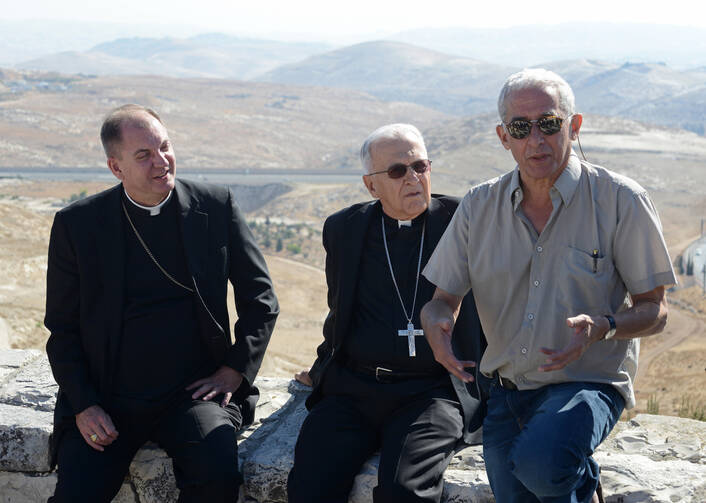U.S. bishops visiting the Holy Land on Sept. 11 said an on-the-ground tour about the situation in East Jerusalem heightened their awareness of the settlement issue in the divided city. “The expansion of settlements is quickly driving [the possibility of a two-state solution] off the drawing board,” said Bishop Richard E. Pates of Des Moines, Iowa, chairman of the U.S. bishops’ Committee on International Justice and Peace. During a two-hour tour, the Israeli attorney and activist Daniel Seidemann shared his concerns for the increasingly shrinking window of opportunity to push forward the concept of the two-state solution to the Palestinian-Israeli conflict. He said that while the Israeli enclaves embedded in East Jerusalem remain small, with at most 2,500 Israeli Jews living there, it is still possible to withdraw them, but that if the settlements continue to expand, the situation will become more complicated.
U.S. Bishops Visit East Jerusalem
Show Comments ()
2
Comments are automatically closed two weeks after an article's initial publication. See our comments policy for more.
Eugene Fitzpatrick
10 years 9 months ago
I hope these bishops, now back home, get their colleagues to use every pulpit in the land to raise the parishioners' awareness and indignation concerning the moral and physical devastation of the Holy Land by Israel. The objective is to attain the critical mass of Catholic voices that forces the politicians to listen to the demand that they stop their immoral sycophancy towards the pro-Israel lobby. For example, if all the Catholic leadership of Pennsylvania were to persistently address this moral crisis from every pulpit in the state, a vast outflow of indignation directed at their two Irish-Catholic U.S. Senators might have them stop their unvarying malicious support of Israel's inhumanity. I know this is largely a case of 'wish being father to the thought' (it's quite far-fetched to imagine getting Philadelphia on-board the "justice for Palestine " train), but it's worth a try and the status quo is utterly reprehensible.
JLGEII@aol.com
10 years 9 months ago
Accusations of Israeli misbehavior are becoming a regular feature of America Magazine. What disturbs me is how many times these complaints are simply off-base and leveled without any real understanding of the facts or context. There are indeed Jewish neighborhoods in Jerusalem and Palestinian neighborhoods in Jerusalem. In a two-state solution it is likely that the majority Palestinian neighborhoods will become part of Palestine, and the majority Jewish neighborhoods will become part of Israel. But surely neither America nor the Bishops are taking the position that there needs to be some sort of Apartheid system in place, where certain neighborhoods are "Palestinian only" or "Jewish only." Interestingly, in the last few years there has been a marked increase in the number of Palestinians moving into the Jewish neighborhoods in Jerusalem. Would we refer to these Palestinians as "settlers"? Does the fact that they are moving into Jewish areas make a two-state solution impossible?
It is also of interest that just last month the Jerusalem municipality approved a large construction plan for 2,200 homes in a Palestinian neighborhood. Why did America not see fit to report that?
Please -- we need to adopt a more reasoned and fair approach to the way we deal with this conflict. It cannot simply be an assumption that anything Israel does is nefarious and wrong, which is the theme I see consistently on the pages of this magazine.
Fr. James Loughran SA
Graymoor Ecumenical & Interreligious Institute
New York
The latest from america
On July 7, settlers carried out a daytime arson attack on the Church of St. George and a Byzantine Christian cemetery. The fifth-century church is “one of the oldest and most venerated places of worship for Christians in Palestine.”
Pope Leo XIV met with Ukrainian President Zelenskyy today and reaffirmed the Vatican's willingness to host peace talks between Russia and Ukraine.
Over 20 years ago, I was a college student who didn’t want to return to an unstable home. So instead, I found a job as a lifeguard at a Christian summer camp in the Texas Hill Country.
Although the IRS recently allowed religious organizations to address their faithful about electoral politics, the Church will not speak on specific candidates.








